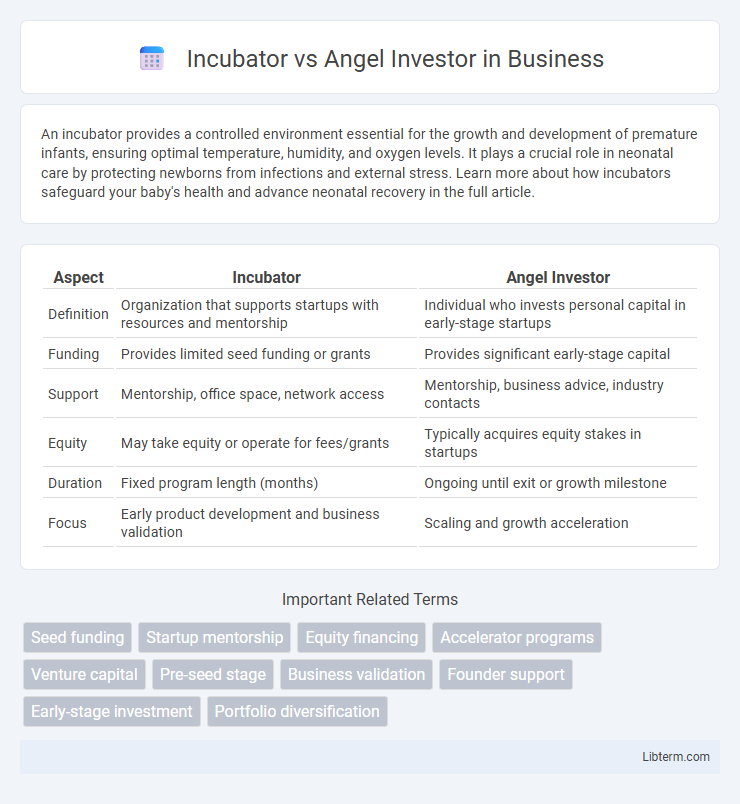An incubator provides a controlled environment essential for the growth and development of premature infants, ensuring optimal temperature, humidity, and oxygen levels. It plays a crucial role in neonatal care by protecting newborns from infections and external stress. Learn more about how incubators safeguard your baby's health and advance neonatal recovery in the full article.
Table of Comparison
| Aspect | Incubator | Angel Investor |
|---|---|---|
| Definition | Organization that supports startups with resources and mentorship | Individual who invests personal capital in early-stage startups |
| Funding | Provides limited seed funding or grants | Provides significant early-stage capital |
| Support | Mentorship, office space, network access | Mentorship, business advice, industry contacts |
| Equity | May take equity or operate for fees/grants | Typically acquires equity stakes in startups |
| Duration | Fixed program length (months) | Ongoing until exit or growth milestone |
| Focus | Early product development and business validation | Scaling and growth acceleration |
Introduction to Startup Funding Options
Startup funding options vary widely, with incubators providing early-stage companies access to resources such as mentorship, office space, and networking opportunities, often in exchange for equity. Angel investors offer direct capital investments, typically during the seed stage, bringing not only funds but also industry experience and valuable connections to the startup. Understanding the differences between incubators and angel investors is crucial for entrepreneurs seeking tailored support and funding to accelerate their business growth.
What is an Incubator?
An incubator is a program or organization designed to support early-stage startups by providing resources such as office space, mentorship, and access to networks to accelerate growth. Unlike angel investors who provide direct capital investment, incubators offer a structured environment with educational workshops and strategic guidance. Startups benefit from incubators through collaborative community settings that foster innovation and reduce operational risks during the critical initial phases.
Who Are Angel Investors?
Angel investors are high-net-worth individuals who provide early-stage funding to startups in exchange for equity or convertible debt, often contributing between $25,000 and $500,000 per investment. They offer not only capital but also mentorship, industry connections, and strategic guidance to help startups achieve rapid growth. Unlike incubators, angel investors typically operate independently or within angel groups, allowing entrepreneurs direct access to personalized expertise and resources.
Key Differences: Incubator vs Angel Investor
Incubators provide structured support, resources, and mentoring to early-stage startups, often including office space and access to a network of experts, while angel investors primarily offer financial investment and strategic guidance in exchange for equity. Incubators typically operate for a fixed period, focusing on business development and market validation, whereas angel investors may provide ongoing funding based on growth milestones. The key difference lies in incubators emphasizing hands-on, comprehensive support versus angel investors focusing on capital and high-level advice.
Pros and Cons of Incubators
Incubators provide startups with structured support, including mentorship, office space, and access to a network of investors, which accelerates early-stage growth and reduces operational risks. However, they often require equity stakes and can impose time-bound participation, limiting a founder's flexibility and control over business decisions. While incubators foster collaboration and resource sharing, their competitive selection process and resource constraints might exclude some promising ventures from benefiting.
Pros and Cons of Angel Investors
Angel investors provide crucial early-stage funding, often bringing valuable industry expertise and networking opportunities that can accelerate startup growth. However, they may demand equity stakes that dilute founders' ownership and sometimes exert significant control over business decisions. Their involvement tends to benefit startups with scalable models but might not suit companies seeking long-term, non-dilutive support available through incubators.
How to Choose Between an Incubator and Angel Investor
Choosing between an incubator and an angel investor depends on your startup's specific needs, such as funding amount, mentorship, and network access. Incubators offer comprehensive support including office space, business training, and access to a collaborative community, typically ideal for early-stage startups seeking structured guidance. Angel investors provide flexible capital infusion and strategic advice, often favoring entrepreneurs with proven concepts who need rapid funding without relinquishing significant control.
Success Stories: Incubator vs Angel Investor Funded Startups
Startups funded by incubators like Y Combinator have produced success stories such as Airbnb and Dropbox, showcasing the benefits of structured mentorship and access to extensive networks. Angel investor-backed companies like Uber and WhatsApp highlight the impact of early-stage, high-risk capital investments combined with strategic guidance. Comparing outcomes, incubator startups often benefit from a collaborative environment, while angel investor-funded firms leverage personalized funding and industry expertise for rapid growth.
Common Myths About Startup Funding
Incubators and angel investors are often misunderstood as interchangeable sources of startup funding, but they serve distinct roles with unique benefits and expectations. Common myths include the belief that incubators provide direct capital funding, whereas their primary offering is mentorship, resources, and network access to accelerate growth. Angel investors supply critical early-stage capital but expect equity and active involvement, challenging the misconception that they are purely financial sponsors without strategic input.
Which is Right for Your Startup?
Choosing between an incubator and an angel investor depends on your startup's stage and needs. Incubators provide structured mentorship, office space, and resources in exchange for equity, ideal for early-stage ventures seeking guidance and network access. Angel investors offer direct capital and business expertise, better suited for startups ready to scale quickly and requiring flexible funding without immediate operational support.
Incubator Infographic

 libterm.com
libterm.com